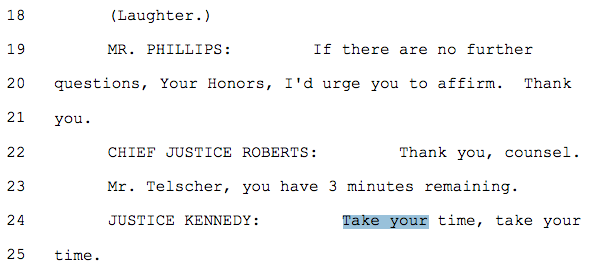Yesterday, after the audio of the Octane Fitness, LLC v. Icon Health & Fitness, Inc. case was released, I engaged in a Twitter-flurry of rage when I found out that the Supreme Court doctored the audio, and eliminated the disruption from the protestor. The New York Times has taken note of this.
For that reason, the protest and attendant security breach was big news to this paper, and nationwide. Mr. Newkirk was immediately arrested and chargedwith a “harangue” at the Court. (Insert joke about Justice Antonin Scalia here). By Friday afternoon, the video showing Mr. Newkirk (there are several others) had more than 130,000 views. In other words, the protest is no secret.
And yet the Court decided to pretend it never happened. The incident has been redacted from the official transcript of the oral argument, and snipped out ofthe audio that the Court made available Friday morning. Voila! All is as silent and respectful as ever.
It’s likely that this hasty re-clothing of the emperor will be justified by the don’t-encourage-them philosophy — the equivalent of the producers of televised sporting events studiously not training their cameras on the knuckleheads who run out on the field.
I find this appalling. This happened. It was widely reported in the media. It is on YouTube. How can the Supreme Court pretend this never happened?! Will the original tapes still be deposited in the National Archives, or will we only get the doctored version?
This is why the Supreme Court will never permit live-streaming of oral arguments–whether audio or otherwise–because they want to retain the control over what people learn about the Court.
I wonder who in the Supreme Court made the decision to edit the audio? Did it come from the Public Information Office? Someone in IT? The Justices themselves?
Update: Someone on Twitter suggested that it is possible that the microphones did not pick up the audio, and it was not edited. This is a possibility. I can’t tell how much silence is too much silence of if the recording was cut. Maybe those who were in the Court can measure out the time of the arguments and interruptions. In truth, the fact that we even have to ponder this question should be a reason why the Court should not be in charge of recording their own audio.
Update 2: Professor David S. Cohen notes that during arguments in Gonzales v. Carhart, at 36:33, there was a protestor, and you can hear it loud and clear. David writes, “odd they didn’t doctor carhart.” That is an awesome pun!
Update 3: Michelle Olsen indicates that the audio was edited.
@JoshMBlackman @Dailywrit Josh-It was definitely edited. On the video, you can hear JGR say, "Thank you, counsel." Then 20 secs of protest.
— Michelle Olsen (@AppellateDaily) March 1, 2014
@JoshMBlackman @Dailywrit Transcript has AMK telling atty post-protest: “Take your time, take your time.” I can’t hear that in audio.
— Michelle Olsen (@AppellateDaily) March 1, 2014
@JoshMBlackman@Dailywrit Transcript has AMK telling atty post-protest: “Take your time, take your time.” I can’t hear that in audio.
— Michelle Olsen (@AppellateDaily) March 1, 2014
As Michelle notes, this portion of the transcript, where Justice Kennedy tells the lawyer to “take your time” during the protest, was edited out of the audio. I include a screenshot in the event the transcript is modified.
